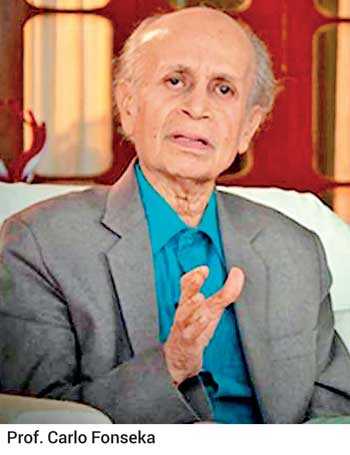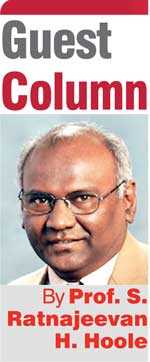Wednesday Feb 18, 2026
Wednesday Feb 18, 2026
Thursday, 5 September 2019 00:00 - - {{hitsCtrl.values.hits}}
Note: My good friend Carlo is gone. I am thankful for three things. First that he joked about the Newton obituary at the end of this article saying it was premature. Indeed he outlasted it by three years. Second, it was last week that I got a chance to visit him at the National Hospital. His request to me was that I visit a 42-year-old Tamil man Jesuthasan he had befriended who was alone and awaiting a difficult heart operation. That is the man Carlo was. He remembered only “Intensive care”. I found Jesuthasan and visited him too.
Now the third. Carlo was an avowed atheist. He has dedicated his body to a medical school. However, he took his wife to Church regularly. I remind Aunty Carlo of the promise to her through Acts of the Apostles, 16: 30-31 because of her faith: Then he brought them out and asked, “Sirs, what must I do to be saved?” They replied, “Believe in the Lord Jesus and you will be saved, you and your household.” – S. Ratnajeevan H. Hoole 
Time was when science was just one endeavour of many for the great scientists of the world. For example, Sir Isaac Newton was a true polymath – a celebrated master of astronomy, chemistry, mathematics, physics and theology1. Another polymath was The Rev. Charles Lutwidge Dodgson, more popularly known by his pen name Lewis Carroll. He was an Oxford mathematician, Anglican theologian, musician, author, publisher and the political scientist to whom is attributed the electoral system of proportional representation which is presently the subject of raging debates in Sri Lanka and a matter of personal interest to me.
Science now, however, is so specialised with small incremental advances that there are few polymaths today. Carlo Fonseka, MBBS (First Class) University of Ceylon, Ph.D. University of Edinburgh, Emeritus Professor of Physiology of the University of Ceylon (now Colombo), is such an exception – engaging in medicine, management of public bodies, theology, music, leftwing Trotskyite politics, and many other things and bringing these to the public through op-ed pieces, radio and television talk shows.
This book under review consists of a collected volume of his selected writings and speeches over a lifetime on diverse topics such as medicine, science, philosophy and ethics, religion, economics, politics, education, the arts, biographies he has written and his travel experience. The selection has 34 essays written between 1971 and 2014. Of particular note is his first chapter, appropriately titled “To Err was Fatal”, where in his honesty he details the five deaths he attributes to his erroneous interventions, where it is clear that he is being too hard on himself.
The book has been reviewed in many places as is natural for one from a much-loved public personality. I do not wish to detail the book and take away the thrills of reading it. What I will focus on is Carlo the man. For that is relevant to understanding what he writes.
Carlo Fonseka graduated MBBS from the University of Ceylon and earned his doctorate from the University of Edinburgh. His doctoral work on how the pituitary gland puts out Growth Hormone has become the stuff of textbooks.
Greatness in life involves the ability to communicate. Almost all great men evince this truth. Most successful men in Sri Lanka are no exceptions and products of the church and her schools which gave them their skills. To cite one striking example, S.W.R.D. Bandaranaike was a product of Anglican education. Most public spokesmen of the LTTE were Tamil Christians although for its membership of the LTTE was rarely able to draw from Christians.
Likewise, Carlo is a complete product of the Roman Catholic Church and her St. Joseph’s College, Colombo. His versatility with the English language is such that I have met a doctor who a generation later preserves his handwritten notes on physiology as Carlo lectured as a monumental work of literature. Around the year 2004, we shared the same office while being members of the UGC and, in the absence of his secretary, I had the pleasure as his friend of typing his articles as he dictated. They were always perfect on the first go. (Unfortunately the privileges of high-up government service had then prevented him from learning the computer. It appears that he has become computerate though not to the degree that he is literate). However, communication alone is not enough for greatness. The absence of taboos is another dimension of greatness. For example, in his stark honesty, he once confessed to me of how his conjugal engagements early into marriage in his house officers’ quarters inordinately delayed him from visiting a patient in the ward. In his linguistic dexterity with command of the English language, he put it so elegantly whereas from another man it might have seemed crude vulgarity. It is that attitude and skill of his that gave the world the privilege of reading how medical negligence does lead to deaths even from caring, ethical doctors. 
The medical school could not keep Carlo engaged in the pedestrian activities of a university where today we:
Split what can be meaningful papers into small inane bits to play the numbers game (where administrators count papers because in the specialised world of science they cannot know the difference through actually reading the papers),
Have journals which will publish anything for a fee, and so many citation indexes that make a mockery of journal evaluations,
See university administrations claiming that grant money is important as research because overheads give them the best offices in a university,
Recognise even university ranking is subject to gaming, and
Every metric to measure quality is countered by clever academics by another metric they invent to cheat the system2.
Carlo I am sure saw this deterioration of the university ethos early and left behind his high powered research in physiology to work on more important things like superstitions, politics and religion. By far his most successful endeavour is his world-famous demolition of the myths behind fire-walking. Drawing from my upcoming textbook3,
“Carlo Fonseka became most famous for his scientific elucidation and personal demonstration of how fire-walking is done by Buddhist and Hindu devotees who walk across embers without burning themselves. He starred in a British documentary where he fire-walked, an area where others feared to tread and came a cropper by fire walking to show it can be done by anyone and in the process burnt their soles badly.
Historical commentary and book review: The Man Carlo Fonseka and his book, Essays of a LifetimeS. Godage &Bros Ltd., Colombo, 2016. 368 pages, SL Rs. 1,320. US$ 20.
To demonstrate that there is nothing religious, Carlo and his team deliberately downed arrack (the local brew) and pork (which devotees abstain from to acquire spiritual power to do the magical walk) before successfully fire walking in front of British TV cameras with British science fiction writer Arthur C. Clark watching: https://metavideos.com/video/1391344/fire-walk-by-prof-carlo-fonseka Carlo came out with the rules of how it is done – walking fast without allowing the soles to heat enough to reach ignition point to burn the flesh, and making the rectangular fire bed wide to make it seem big while the length one walks across is narrow, thereby giving the impression of walking across a large bed of embers, etc. He showed that the thick soles of the fire walkers who never use footwear also helped.
Carlo’s forays into politics, however, were a disaster because, although he acted with integrity, his associates did not. As a member of the Trotskyite Lanka Sama Samasamaja Party (LSSP), Carlo and his LSSP friends under the late N.M. Perera, D.Sc. Lond., did Tamils proud by standing up for Tamil rights and parity of status for Tamil with Sinhalese. However, as the LSSP realised that the policy was not winning them votes, they abandoned their noble ideals. Carlo had to lapse into silence. As the political culture in Sri Lanka deteriorated, Carlo withdrew into religion and music and cultivated a new hairdo to match. Whether for better or worse I am unable to decide. He completed an MA degree in Buddhism. Initiated into Sinhalese music at St. Joseph’s College, he has made a name for himself as a popular musician and one of his lyrics is now sung at Sinhalese weddings as the bride goes away and others are used in award winning movies.
In 2005 President Chandrika Bandaranaike Kumaratunga, the widow of slain leader Vijaya Kumaratunga (Carlo’s elder sister’s son) was rooting for her brother Anura Bandaranaike to succeed her as the Sri Lanka Freedom Party leader while Mahinda Rajapaksa staked his own claim. Carlo inclined toward Rajapaksa. As we sat in our office together, he mused that as he was playing with his favourite grandnephew (Chandrika’s son), Chandrika reminded him, “Carlo Maamaa [Uncle], remember he is Anura’s nephew.” That stopped Carlo short of an outright endorsement of the Mahinda Rajapaksa candidature except for an op-ed praising Mahinda’s father George Rajapaksa. Again later as the LSSP alliance with the Rajapaksa regime continued while the government soured with the people, and was summarily voted out in presidential and general elections in the year 2015, his loyalty to the LSSP kept him silent as many unsavoury things went on. Everyone made money, but not Carlo. The only money he made was when he fled Sri Lanka in March 1988 after making a strong eulogy condemning the killers at the funeral of his nephew Vijaya Kumaratunga who had been murdered by the JVP insurgents, to accept an appointment at the UN University in Helsinki. He told me that he returned with $30,000 with which he built his house and gave the rest for his children’s education. His foreign travels were limited because of his membership in a community party. The US Embassy refused him a visa even for official trips because there was ban on visas for communists. Besides the house, Carlo’s only sign of wealth is his Micro Car.
This period saw Carlo working quietly in administration. The best testament to his value as a person is that when the government changed in 2015, he handed in his resignation from the posts of President of Sri Lanka Medical Council and Chairman of the National Authority on Tobacco and Alcohol. However, his letters of resignation were promptly returned by the new President. Such is the perception of him as being politically conscious and yet above politics.
Thus in conclusion we may say of Carlo what Newton’s tomb at Westminster Abbey says in Latin: “Mortals rejoice that there has existed such and so great an ornament of the human race!”
Thankfully it is much too early for a real eulogy for Carlo. God bless him and give us many more years of his insightful and sharp mind.
(This article appeared in the Indian journal Current Science.)
References:
1 http://science.howstuffworks.com/innovation/famous-inventors/5-isaac-newton-inventions.htm
2 Hoole, S.R.H., “Gaming Performance Measures: Institutional and Individual,” IETE Technical Review. Accepted. In press.
3 Hoole, S.R.H. and Hoole, M.M. and Hoole, Dushyanthi, Ethics for Professionals – a Human Rights, Internationalist Perspective, Cognella Publishers, San Diego, CA, 2018.